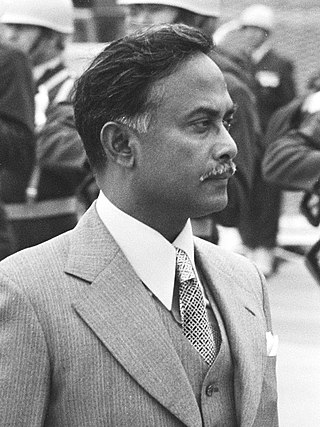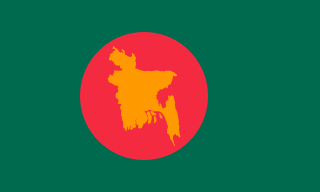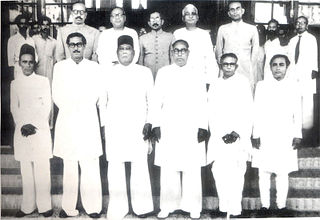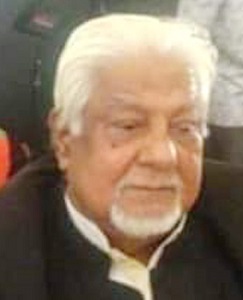Related Research Articles

Ziaur RahmanBU HJ HOR was a Bangladeshi military officer, freedom fighter and politician who served as the sixth President of Bangladesh from 1977 until his assassination in 1981. One of the leading figures of country's Liberation War, he broadcast the Bangladeshi declaration of independence on 27 March 1971 from Chittagong. He was the founder of Bangladesh Nationalist Party (BNP). He previously served as the third chief of army staff from 1975 to 1978 with a minor break.

The independence of Bangladesh was declared from Pakistan on 26 March 1971, celebrated as Independence Day. The Bangladesh Liberation War started on 26 March and lasted till 16 December 1971 which is celebrated as Victory Day in Bangladesh. In the early hours of March 26, 1971, the undisputed leader of Bengali, Sheikh Mujibur Rahman, declared independence before being arrested by the Pakistani army. Later many others declared on behalf of Sheikh Mujibur Rahman.

Khondaker Mostaq Ahmad was a Bangladeshi politician. He was the Minister of Commerce in the third Mujib Rahman ministry under Sheikh Mujibur Rahman, and assumed the presidency of Bangladesh after the Assassination of Sheikh Mujibur Rahman on August 15, 1975. He praised the assassins as "sons of the sun" and put cabinet ministers loyal to Sheikh Mujibur Rahman in jail. He was himself deposed by another coup, less than three months later on November 3, 1975.
Shah Azizur Rahman was a Bangladeshi politician who served as the prime minister of Bangladesh. However, he was the subject of considerable controversy for his collaboration with the Pakistan Army against the struggle for the independence of Bangladesh.

Moudud Ahmed was a Bangladeshi lawyer and politician. He was a standing committee member of the Bangladesh Nationalist Party. Ahmed was elected as a Jatiya Sangsad member five times from the Noakhali-1 and Noakhali-5 constituencies.

Mujibnagar, formerly known as Baidyanathtala (Boiddonathtola) and Bhoborpara, is a town in the Mujibnagar Upazila of Meherpur District in Khulna, Bangladesh. The Provisional Government of Bangladesh was formed on 10 April 1971, however, sworn in on 17 April 1971 in this place by the elected representatives of the Bengalees, that led the Bangladesh Liberation War, who were leading the guerrilla war for the independence of Bangladesh from Pakistan in 1971. The place was renamed Mujibnagar by the proclamation of independence, in honour of then imprisoned Sheikh Mujibur Rahman, who had declared Bangladesh independent. The actual capital of the government while in exile was Calcutta. A memorial complex covering 20.10 acres (8.13 ha) has been built at the site where the ministers of that first government took their oaths.

The Jatiya Samajtantrik Dal is a political party in Bangladesh. The party was founded by Serajul Alam Khan. The party was dominant during the 1972–1975 Bangladesh insurgency. The current party president is Hasanul Haque Inu, and the general secretary is Nazmul Haq Prodhan.

Ataur Rahman Khan was a Bangladeshi lawyer, politician and writer, who served as the chief minister of East Pakistan from 1 September 1956 – March 1958, and as the prime minister of Bangladesh from 30 March 1984 to 1 January 1985.

Independence Day is celebrated on 26 March as a national holiday in Bangladesh. It commemorates the country's declaration of independence from Pakistan in the early hours of 26 March 1971.

The Proclamation of Bangladeshi Independence, refers to the declaration of independence of Bangladesh on 26 March 1971, at the onset of the Bangladesh Liberation War by Bangabandhu Sheikh Mujibur Rahman; the following day Major Ziaur Rahman declared independence on behalf of Sheikh Mujibur Rahman from Swadhin Bangla Betar Kendra radio station in Kalurghat, Chattogram. On 10 April, the Provisional Government of Bangladesh issued a proclamation on the basis of the previous declaration and established an interim constitution for the independence movement.

The Bangladesh Freedom Party, also known as Freedom Party is a political party founded by Sayed Farooq Rahman, Khandakar Abdur Rashid and Bazlul Huda who were the chief organisers of the assassination of Sheikh Mujibur Rahman on 15 August 1975.

Mashiur Rahman, also known as Jadu Mia, was a senior minister, with the rank and status of prime minister in charge of the Ministry of Railways, Roads and Highways of Bangladesh from 29 June 1978 to 12 March 1979. He was the founder of Bangladesh Jatyiotabadi Dal, the whole process of transition to multi-party democracy was his brainchild. He named the party and the election symbol was given to the party from his party NAP.
Nizam Mohammad Serajul Alam Khan, commonly known as Serajul Alam Khan, also called as Dada, Dadabhai and by his initials SAK, was a Bangladeshi politician, political analyst, philosopher and writer who spearheaded the Bangladesh liberation movement under the leadership of Sheikh Mujibur Rahman but also became one of the controlling forces of political polarization in post-independence Bangladesh.

Begum Sheikh Fazilatunnesa Mujib, commonly known as Begum Mujib or Bangamata, and also known by her nickname Renu, was the wife of Bangabandhu Sheikh Mujibur Rahman, the first President of Bangladesh. She is the mother of Sheikh Hasina, the leader of the Awami League and former Prime Minister from 2009-2024. She was killed along with her family.

Muhammad Yusuf Ali was a Bangladesh politician. He was the first minister for Education and Cultural Affairs in the first cabinet of Bangladesh.

The military coup in Bangladesh on August 15 of 1975 was launched by mid-ranking army officers in order to assassinate founding president Sheikh Mujibur Rahman, whose administration post-independence grew corrupt and reportedly authoritarian until he established a one-party state-based government led by the socialist party Bangladesh Krishak Sramik Awami League. Mujib, along with his resident family members, were killed during the coup but was survived by his two then-expat daughters, one of them being future prime minister Sheikh Hasina. The officers were led by Capt. Abdul Majed, Maj. Sayed Farooq Rahman, Maj. Khandaker Abdur Rashid and Maj. Shariful Haque Dalim.
The 3 November coup d'état was organised by Brig. Khaled Mosharraf against President Khondaker Mostaq Ahmad to remove him from the presidency and the assassins of Sheikh Mujibur Rahman from power: Capt. Abdul Majed, Maj. Syed Faruque Rahman, Maj. Khandaker Abdur Rashid and Maj. Shariful Haque Dalim. The coup resulted a return of Mujibist forces in Bangladeshi politics for a short time.

Nurul Islam Manzur was a former Bangladesh Awami League politician and the former State Minister of Communication in the cabinet of Sheikh Mujibur Rahman. He was aligned with the Bangladesh Nationalist Party.

Ziaur Rahman's tenure as the President of Bangladesh started with his acquisition of the presidency from Abu Sadat Mohammad Sayem on April 21, 1977 after the latter resigned from his position on health grounds. Zia became the President of Bangladesh at a time when Bangladesh was suffering from a host of challenges that included low productivity, food shortage that resulted in a famine in 1974, unsatisfactory economic growth, severe corruption and a polarized and turbulent political atmosphere after the assassination of Sheikh Mujibur Rahman and his family members in a coup that was followed by a series of counter-coups in the military. He is credited as a solid administrator with pragmatic policies who contributed to the economic recovery of Bangladesh by liberalizing trade and promoting private sector investments.
The Sayem ministry led what eventually became the first interim government in independent Bangladesh and an unofficial model for future interim regimes. It was formed on 8 November 1975, following the assassination of Brig. Gen. Khaled Mosharraf on 7 November amid a nationwide soldier and public uprising against his 3 November coup d'état. After a three-day coup with support of some high-ranking officers and his Dhaka Brigade, Mosharraf had forced Khondaker Mostaq Ahmad, who, following the 15 August coup that assassinated the founding president Sheikh Mujibur Rahman, replaced him as President of Bangladesh with support of the mid-ranking assassin officers, to resign. Chief Justice Sayem, with the constitutional requirement for the direct election of the president and role of the vice-president as acting president suspended by Mostaq under a martial law proclamation, had been installed in his place. With Mosharraf's death the responsibility of CMLA fell on Sayem.
References
- ↑ Sirajul Islam; Miah, Sajahan; Khanam, Mahfuza; Ahmed, Sabbir, eds. (2012). "Joint Rivers Commission". Banglapedia: the National Encyclopedia of Bangladesh (Online ed.). Dhaka, Bangladesh: Banglapedia Trust, Asiatic Society of Bangladesh. ISBN 984-32-0576-6. OCLC 52727562. OL 30677644M . Retrieved 9 December 2024.
- 1 2 Jiblu Rahman. Vasani-Mujib-Zia (in Bengali). Bangladesh: Mouli Publications. ISBN 9789849302728.
- 1 2 "Dinajpur District". Bangladesh National Portal (in Bengali). Archived from the original on 10 September 2021. Retrieved 12 September 2021.
- 1 2 "Name and tenure of Hon'ble Minister / State Minister / Adviser". Bangladesh National Portal (in Bengali). Archived from the original on 10 September 2021. Retrieved 12 September 2021.